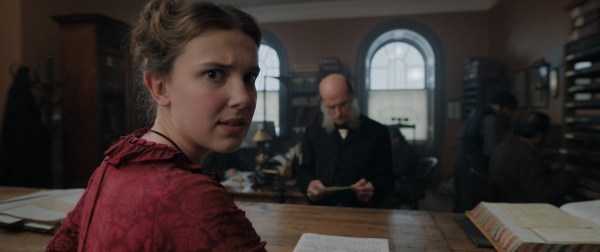
Advertisement
Millie Bobby Brown’s international acclaim is obviously credited to TV’s Stranger Things, and she has embarked on a promising film career as well thanks to last year’s Godzilla: King of the Monsters. The game is definitely afoot, however, with Enola Holmes, a breathtaking and resonant adventure featuring Brown as Sherlock Holmes’ resilient younger sister. Thanks to Brown’s winning performance and all-around excellence filmmaking wise, Enola Holmes is the start of a potentially blockbuster franchise.

Enola Holmes (Millie Bobby Brown) has been raised in a country estate by her eccentric mother Eudoria (Helena Bonham Carter). Eudoria, a widow, has homeschooled Enola in a scholarly and survivalist manner.
Instructed to read every book in the house, Enola is also adept at chess and jiu-jitsu. With a warrior and intellectual mindset, our heroine’s only weakness is socialization. Enola’s mother is her entire world, and when Eudoria disappears without a trace, she wrangles up a few clues that ultimately leads her to London.

Before she gets to the big city, she is reunited with her older siblings Sherlock (Henry Cavill) and Mycroft (Sam Claflin). Though she shares the awe inspiring deductive ability of Sherlock, Mycroft is the next in line to care for her. While Sherlock initially shirks responsibility over Enola, Mycroft is hell bent on placing Enola in a boarding school under the supervision of icy headmistress Miss Harrison (Fiona Shaw).

A simple twist of fate leads Enola to Lord Tewksbury (Louis Partridge), a youth who is running away from all his privilege to carve out a life on his own. Tewksbury’s own life is in danger thanks to an imposing stranger (Burn Gorman), and Enola places herself right in the middle of this predicament.
With a running time of 123 minutes, some viewers may think that Enola Holmes carries a bloated narrative. Such an assertion is thankfully inaccurate thanks to brisk and confident direction by director Harry Bradbeer (Fleabag, Killing Eve) and an engaging script by Jack Thorne (Radioactive).

In true Fleabag style, Enola breaks the fourth wall on a consistent basis for a bit of levity and connection with the viewer, and this oftentimes annoying device is perfectly suited for the film. Millie Bobby Brown’s charaismatic and finely tuned work as Enola is a joy to watch, and the continuing adventures of Sherlock’s whipsmart sister can’t come soon enough.
Based on the work of author Nancy Springer, Enola Holmes also thrives in the spirit of adventure. There are essentially two mysteries to solve within the story, and there is enough action, twists, and brilliant clue solving to keep us engaged through the film’s final (and evocative) moments.
The chemistry between Brown and Cavill (it’s great to see Sherlock possessing a nurturing instinct) is fun to watch, but Brown also shines in her moments with Partridge and Bonham Carter. Enola Holmes, at the very least, is the perfect vehicle to show off Millie Bobby Brown’s innate talent. That said, the production design, editing, music (I’ll be listening to Daniel Pemberton’s pitch perfect score after finishing up this review!) also exist in a rarefied creative plane.

There is a reform bill and voting rights that are also part of Enola Holmes’ storyline, and being a woman living in 1884 England assumedly must have its disadvantages. Enola doesn’t need a series of clues to understand that she must ultimately choose her own path and use her crime solving skills to society’s benefit.
Enola Holmes is escapist fare that, thanks to Millie Bobby Brown (she’s also a producer) and an equally able cast and crew, is a can’t miss experience. Expect more Enola adventures to come, and if the succeeding films are even half as good as this film, our viewing experiences will be more than elementary.
Enola Holmes Rating: 4.5 out of 5
To check out other films that are coming out this week, listen to the latest episode of CinemAddicts, a podcast I co-host with Groupers director Anderson Cowan:
Enola Holmes is filled with revolutionary and visionary women, and if you have not heard of visionary film pioneer Alice Guy-Blaché, we spotlight the director on Find Your Film:







